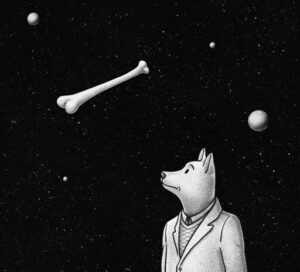If you are trying to live a happy, contented life as a bachelor, you have an enemy, and the enemy is inside. Actually, there are about a dozen of them.
I’m talking about a set of destructive, interlocking negative beliefs about the alleged perils of bachelorhood. These beliefs can ruin your chances of having a good, satisfying bachelor life. They can leave you stuck, feeling sad, remorseful, envious, shamed, or uncertain.

Here are some examples. If you’re a bachelor, you’re immature. There’s something wrong with you; you didn’t measure up somehow. Your life won’t be as meaningful and fulfilling. You won’t be as happy. You won’t live as long. You will miss out on intimacy. You will miss out on love.
In order to have a satisfying life as a bachelor, you have to uproot these beliefs at a core level. That is not easy, because these beliefs get instilled in us at an early age, they come at us from a variety of quarters (family, media, religion, biology, peers, etc.) and they are repeated perpetually.
I want to pick apart these ideas, one at a time.
I’ll focus on this one first — the idea that bachelors miss out on love, and that, in particular, they miss out on the deepest and most profound form of love there is, a long-term, sexual-romantic relationship with a woman.
As I’m sure you’ll agree, if that is true, it’s is a pretty big deal. If we are missing out on one of the most meaningful experiences in life, that’s bad. So, let’s take a look at this idea.
I’ve wrestled with it for many years, and I’ve 95% rooted it out of my system. I’d like to pass on what I’ve learned. If you’ve ever been bothered by doubts in this area, you might find this useful. Even if you already know what I’m about to say, it can help to get a refresher, because the cultural and biological programming is so pervasive.
The Love Buffet
The first point, and this is a pretty obvious one, is that love comes in many forms, not just one. Just because you forgo a serious romantic-sexual relationship with a woman doesn’t mean that you are “missing out on love.”
Let’s define terms. What is “love,” anyway? The best definition I know comes from Thomas Aquinas. He said that love is “willing the good of the other, as other.” Love is wanting what is good for someone else, and then doing something about it. It’s more an act of the will than a feeling, although feeling enters into it.
When you help or support someone, that is love. When you care for an animal, that is love. When you are kind to someone, that is love. When you care for nature, that is love. When you support a worthy cause, that is love. When you work to develop yourself, that is love (whatever you do to yourself affects others, so self-care is care for others). Whenever you do something that makes your corner of the world better, even in a small way, that is love. You can love friends, pets, family, animals, nature, neighbors, spirit or God, ideas or causes.
So, unless a man avoids all those sorts of actions – unless he operates only out of a narrow, crabbed self-interest – he will not “miss out on love.”
In fact, I’d argue that bachelors are capable of experiencing more love in their life than the coupled. Why? Because being part of a couple consumes enormous time and energy, which is freed up for other purposes when you are single. Because there is no need to “market” yourself for the opposite sex, and so instead you can approach them in a spirit of authenticity. Because the single life brings peace and quiet, out of which can spring kindness. Because you can better care for yourself, and by doing so become a more generous person.
I think it’s pretty easy to dispense with the idea that bachelors “miss out on love” by forgoing romantic-sexual relationships. Love is like a buffet, and just because you pass up one item doesn’t mean you go away hungry. There are plenty of choices and possibilities.
However, there is a problem. The belief we’re addressing doesn’t merely say that bachelors are missing out on love in general, but that they are missing out on a particular form of love – a sexual-romantic relationship with a woman — which is the highest and most profound form of love there is.
So, we need to push our analysis a little further. It’s entirely possible that we could have love, but it would be a sort of “second-best” version, and we would still be missing out on what is, allegedly, the deepest and most profound type of love there is.
I’ll make four points.

Highly Conditional
Let’s take a look at what love for a man looks like, within in a sexual-romantic relationship.
Women love children unconditionally, but their love for men — generally speaking — is conditional. That is as it should be and must be. Women are the gatekeepers of reproduction, and they incur a heavy burden and increased vulnerability when they get pregnant. As a result, they must be picky, choosy. There is nothing wrong with that. That is how nature has shaped them.
However, it does mean that their attraction to you, and their attachment to you, is not unconditional. To be sure, neither is yours for her — you also have conditions. You aren’t going to love just any woman who shambles through the door. But, as a group, women tend to be considerably pickier — more conditional — in their attraction, attachment, and love than men do.
“Hypergamy” is the word that often gets thrown around at this point, and it’s worth looking into if you haven’t already. The basic idea is that women marry across and up the socioeconomic ladder — they try to get the best mate they can, with “best” being defined in terms of 1) the ability to provide financial and other resources to assist in raising children; 2) status in the community; 3) security (both emotional and physical), and 4) looks. Personality is a factor, too, particularly when certain elements (e.g., confidence, sociability, drive) reflect potential for the other aspects just mentioned.
In general, women do not choose mates based on the man’s personality or character — on who they are as people — except in so far as “who they are as people” satisfies those criteria (provisioning, status, security, looks).
For most women, this isn’t a conscious process, any more than your attraction to beautiful young women is a conscious process. It’s just how evolution has shaped them. These choices have obvious evolutionary advantages for the woman, her children, and the species.
What this means, though, is that you aren’t really loved so much for who you are as for what you can do for her — provide for her, make her feel safe and protected, increase her social status, arouse her sexually.
I’m not saying that women experience their love this way consciously. I’m saying that this is how it actually operates. I’m also not saying that some women do not eventually get to the point in a relationship where they truly love the man for his whole self, not just for the qualities just mentioned. This generally takes a long time, however, and I think it is the exception rather than the rule. I’m speaking about the majority of relationships, particularly in the early and middle phases.
In any case, for a man, love is a highly conditional thing. Assuming he isn’t born handsome and charming, he has to make himself into someone capable of “earning” that love from a woman. He has to qualify. He has to perform. He has to produce. And if he doesn’t do that, or if his performance degrades, the conditional love fades.
Here is the point: a conditional, contingent form of love cannot be the “deepest and most profound” type of love there is. Indeed, we recognize that the more conditions there are on love, the less admirable it is. We admire a woman’s ability to love her children even though they are unruly brats, precisely because her love is so unconditional. We admire a man’s willingness to sacrifice himself for strangers, precisely because that love is so unconditional. God’s love is said to be unconditional. So how can a highly conditional form of love be “the deepest and most profound”? It can’t. It isn’t.
Again, I’m not saying that there are not exceptions to this. I’m speaking to the general rule, not the exceptional cases. I acknowledge that some couples who’ve been together for decades truly and unconditionally love each other. I know some of them, even though the numbers are very few. I’m talking about how “love” operates in most relationships.
In any event, you can’t call a highly contingent form of love “the deepest and most profound” form of love on Earth. Romantic love is far too conditional to fit that bill.
My Experience Has Been Different
I may be an outlier here (although I doubt it), but my life experience contradicts the notion that romantic-sexual relationships are the deepest form of love.
First, let me be clear that I haven’t lacked romantic-sexual love. I’ve been married and had a number of girlfriends. To one degree or another, I’ve been in love with all of them (cue Julio Iglesias).
But if you take all of the love from all of those relationships and stack it together, it doesn’t come close to the depth and profundity of the love I experienced in relationship to my dogs. I was not expecting this and was honestly stunned by how deep the love between a man and a dog can be. It really hit me hardest when they died.
The love I had for my dogs is orders of magnitude deeper and more profound than anything I’ve ever experienced in a romantic-sexual relationship. It was more pure, heartfelt, authentic, enduring, unconditional, simpler and cleaner, more spiritual and elevated. It was a much more profound experience than the love I experienced in romantic-sexual relationships.
Now, you may be looking down your nose, thinking I’m a crazy dog man. That’s fine. Maybe I am. I’m just telling you that, in my experience, romantic-sexual love doesn’t hold a candle to the depth and profundity of love I have experienced with dogs.
Until one has loved an animal, a part of one’s soul remains unawakened.
Anatole France

Spiritual Disagreement
Is romantic love the deepest and most profound sort of love? According to thousands of spiritual thinkers over millennia of time, the answer is No.
Whatever your opinion on spirituality, we’re talking about thousands of highly intelligent people who have taken this subject very seriously. And their conclusion is unanimous. Romantic-sexual love is one form of love, a potentially good one, but also limited. It is not the deepest or most profound form of love. There are other forms (e.g., agape, unity consciousness) that go well beyond it.
Love is Free, But This is Not
Love has to be a free, voluntary choice, or it’s not really love at all. If you coerce me into loving, that’s not really love. I don’t have a choice. I am being manipulated or forced into it. A love that is compelled isn’t love.
Consider the fact that, over millions of years of evolution, our bodies have developed powerful systems that push us into romantic-sexual relationships. There is a whole panoply of internal mechanisms (e.g., dopamine, adrenalin, oxytocin, testosterone, various neural circuitry) that compels us to seek out sexual-romantic relationships. There is a massive neuronal and hormonal infrastructure designed to do nothing else but this. The reason for its power and prominence is obvious: it perpetuates the species.
For young men, these influences are extremely powerful and virtually inescapable. Fortunately, I’m old enough now that they have subsided, but I remember a time when I was basically a puppet on a string, dancing to the tune of my hormones. I didn’t experience it that way consciously, of course. In my mind, I yearned for love, closeness, and/or sex. In biological reality, though, my mind was being hijacked by a powerful system, hardwired over millions of years, designed to get me to procreate and form the emotional bonds necessary for species survival.
There is nothing wrong with that, of course, and much right with it. But we should be clear that we are not talking about love. Love is a free choice. This is not a free choice. It is a compelled choice – heavily compelled.
Granted, some couples manage to establish a mature, companionate love that persists long after the neurochemistry and hormones settle down, but in most of those cases, the sexual and romantic elements of the relationship fade away, and the relationship comes to resemble a friendship. And friendship is available in many forms, not just between a man and a woman in a committed relationship.
At least in the early stages, romantic-sexual “love” is not really love at all. There are powerful neurochemical forces pushing us into it and holding us there. That is not love, much less the “deepest and most profound” form of love there is.

Summing Up
Love comes in many forms, so you’re not “missing out” on anything. It’s even arguable that bachelors have more potential for love than men who are coupled up.
Romantic-sexual love is not the deepest and most profound type of love.
- For a man, love in sexual-romantic relationships is highly conditional thing. A highly conditional love cannot be the “deepest and most profound” form of love.
- In my own experience, I have found the love for dogs to be orders of magnitude deeper than what I’ve found in romantic-sexual relationships. I am not alone.
- Thousands of spiritual teachers have told us that there are other forms of love that are higher and deeper than sexual-romantic love.
- A massive neurochemical cocktail is required to coerce us into it. Since love has to be a free choice, this cannot be the “deepest or most profound” sort of love there is.
I hope this was helpful in uprooting the belief that, as a bachelor, you are missing out on love – and that, in particular, you are missing out on the deepest form of love. That just isn’t the case.
I will tackle other negative beliefs about bachelorhood in the future.

Thank you, Michael. Well written and thought out.
Very well written article and obviously comes from a very “deep thinker”. I agree with many of the things you said but I also think that so much in life is about “semantics” and people define words from their own experiences in life. I do agree that we can find love in many places and feel love towards many people and many things. I also believe that finding a person who loves you unconditionally and who you love unconditionally is very rare, but also one of the most wonderful things in life. I grew up thinking that I needed a man to feel complete. What I really think I needed was the self-confidence to love MYSELF unconditionally so that I didn’t listen to the “shoulds” that society tried to place on me.
Well i still recognise the face of my dog that i had for 16 years and how i buried it and when.
He was like my younger brother/son and i always looked at him like a junior.
Now that he is no more with me physically for two years. I still recognise the love i had for him and the bond i shared with him.
What most men fail to do (P.S. this is my hypothesis and i could be wrong completely) is they cannot switch out/move on from a relationship they once had with a female.
What needs to be done is that men and boys being conditioned by the society to chase women always as if their entire existence depends on having a wife/girlfriend.
We never teach our boys to practice celibacy, we never teach them to be in control of their 5 senses and make logical decisions. Thats the end result of subversion by the society and the social construct created around men.
But again… we are blessed to have somebody like you sir to actually make us aware of these things which would had been the common sense and wisdom during the days of MIYAMOTO MUSASHI or CHANAKYA or SOCRATES
I would also make an admission. On my part i love mountains i don’t why but i really do. I wish we all could again someday meet somewhere on a campfire.
You are so very romantic! Surely, let’s meet up one day somewhere by the campfire in the mountains! 😀
As a perennial single, I wish more friends saw the value of deeper friendship (a form of love). Are they afraid of showing their vulnerability and authenticity? Singles can do this very well.
Great article! I never thought about romantic love as conditional, but it makes sense!